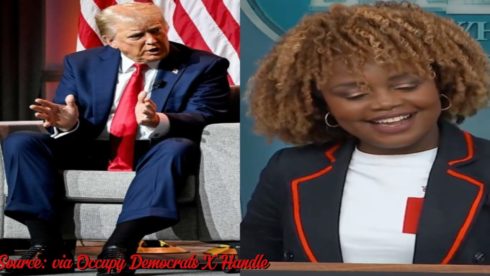Former President Donald Trump ignited a firestorm of controversy with his recent remarks about Vice President Kamala Harris’s racial identity. At a National Association of Black Journalists’ convention, Donald Trump questioned Harris’s heritage, asking, “Is she Indian or is she Black?” He further claimed, “She was Indian all the way, and all of a sudden she made a turn and became a Black person.” These comments have drawn sharp criticism from political leaders, civil rights activists, and the general public, reigniting discussions about race and identity in American politics.
Donald Trump’s statements, widely perceived as racist and inflammatory, demonstrate a profound lack of understanding about multiracial identities in modern America. They also reflect a troubling trend of questioning the authenticity of people of color in positions of power, a tactic that has been used historically to undermine and delegitimize leaders from diverse backgrounds. As the nation grapples with issues of racial justice and representation, Donald Trump’s remarks serve as a stark reminder of the ongoing challenges faced by individuals with complex racial and ethnic identities in the political sphere.
White House Press Secretary’s Powerful Response
White House Press Secretary Karine Jean-Pierre delivered a forceful rebuke to Donald Trump’s comments during a recent press briefing. Speaking from her position as a woman of color, Jean-Pierre denounced Donald Trump’s remarks as “repulsive” and “insulting,” emphasizing that no one has the right to dictate another person’s identity.
Jean-Pierre’s response was both personal and professional, highlighting the gravity of the situation. She stated, “As a person of color, as a Black woman who is in this position that is standing before you at this podium, behind this lectern, what he just said — what you just read out to me — is repulsive.”
Respecting Self-Identification: A Fundamental Right
White House Press Secretary Karine Jean-Pierre has emphasized the essential right of individuals to self-identify, stressing that no one has the authority to dictate how someone identifies themselves. In a powerful statement, Jean-Pierre asserted that self-identification is a personal decision, and it’s crucial to respect individuals’ choices regarding their identity. This sentiment is particularly vital in discussions surrounding race and ethnicity, where individuals with multiracial backgrounds, like Vice President Kamala Harris, often face complex identity questions.
Jean-Pierre’s words serve as a poignant reminder of the significance of self-identification and the importance of acknowledging the intricacies of identity. By emphasizing the need to respect individuals’ self-identification, Jean-Pierre promotes a culture of inclusivity and acceptance, encouraging open discussions about identity and its complexities. As conversations around identity continue to evolve, Jean-Pierre’s statement underscores the fundamental right to self-identify, ensuring that individuals can define themselves without external judgment or scrutiny.
Respect for Vice President Harris’s Position
Jean-Pierre concluded her remarks by calling for respect for Vice President Harris’s position and identity. She stated emphatically, “It is insulting and she is the Vice President of the United States Kamala Harris. We have to put some respect on her name. Period.”
This call for respect not only addresses the immediate issue of Donald Trump’s comments but also speaks to broader issues of dignity and decorum in political discourse. Jean-Pierre’s words serve as a reminder of the respect due to the office of the Vice President, regardless of personal or political differences.
Embracing Multifaceted Identity: Vice President Kamala Harris’s Trailblazing Journey
Vice President Kamala Harris embodies the diverse fabric of American society, proudly identifying as both Black and Asian. Her Indian and Jamaican heritage weaves a rich tapestry of cultural influences, defying simplistic categorizations of race and ethnicity. Harris’s multifaceted identity not only reflects the complexity of American identity but also challenges traditional notions of representation and leadership.
As the first woman of color to hold the office of Vice President, Harris’s rise to prominence marks a significant milestone in American politics. Her unique perspective, shaped by her experiences and heritage, enriches the national conversation on race, representation, and leadership. By embracing her multifaceted identity, Harris paves the way for a more inclusive and nuanced understanding of American identity, inspiring a new generation of leaders to embrace their own complex heritage.
Donald Trump: Backlashes for Political Discourse
The recent controversy surrounding Donald Trump’s comments and the White House’s response has brought to the forefront the ongoing tensions in American political discourse, particularly around issues of race and identity. This incident highlights the need for greater understanding, sensitivity, and empathy when discussing complex issues of personal identity and heritage. As the nation continues to navigate these complex issues, it is essential for leaders and public figures to foster respectful and inclusive dialogue, promoting a culture of understanding and respect.
The White House’s strong stance against divisive and racist rhetoric sets a crucial precedent for addressing such issues in the future. By condemning harmful language and promoting inclusive dialogue, leaders can create a more constructive and respectful political environment. As the nation moves forward, it is essential to prioritize empathy, understanding, and inclusivity, ensuring that all individuals feel seen, heard, and respected. By doing so, America can work towards a more harmonious and equitable society, where diverse perspectives and experiences are valued and celebrated.














